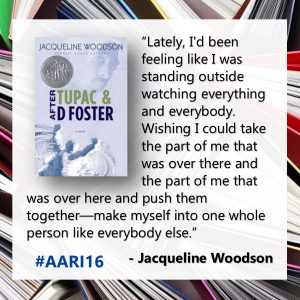 When the Black Caucus of NCTE established the African American Read-In (AARI) over 25 years ago, their ambitious yet confident premise was that a school and community reading event can be an effective way to promote diversity in children’s literature, encourage young people to read, and shine a spotlight on African American authors.
When the Black Caucus of NCTE established the African American Read-In (AARI) over 25 years ago, their ambitious yet confident premise was that a school and community reading event can be an effective way to promote diversity in children’s literature, encourage young people to read, and shine a spotlight on African American authors.
They knew what NCTE member Rudine Sims Bishop wisely wrote:
“Books are sometimes windows, offering views of worlds that may be real or imagined, familiar or strange. These windows are also sliding glass doors, and readers have only to walk through in imagination to become part of whatever world has been created and recreated by the author. When lighting conditions are just right, however, a window can also be a mirror. Literature transforms human experience and reflects it back to us, and in that reflection we can see our own lives and experiences as part of the larger human experience. Reading, then, becomes a means of self-affirmation, and readers often seek their mirrors in books. (1990, p. ix)”
In his recent interview on Education Talk Radio, member Ezra Hyland noted:
“Humans don’t make our stories, it’s stories that make us human (paraphrasing Amiri Baraka). It’s not until we know the stories of each other that we embrace our humanity. When I know the stories of my people and my culture, that’s when I become human myself.”
Yet, as important as it is for children young and old to read African American texts, these texts are regularly challenged in schools, making ALA’s top ten most frequently challenged books lists nearly every year for the past decade.
At NCTE, nearly every quarterly challenge report for the last 10 years has featured at least one title written by an African-American: books like Ernest Gains’ A Lesson Before Dying; Mildred Taylor’s Role of Thunder, Hear My Cry; Toni Morrison’s Song of Solomon and Beloved; and Ralph Ellison’s Invisible Man.
How are we to provide all our students with the windows, mirrors, and sliding doors that allow them to read themselves into their own cultures and the cultures of others if there are those who won’t allow the students to read these texts?
The African American Read-In is one way to open windows, mirrors, and sliding doors.

